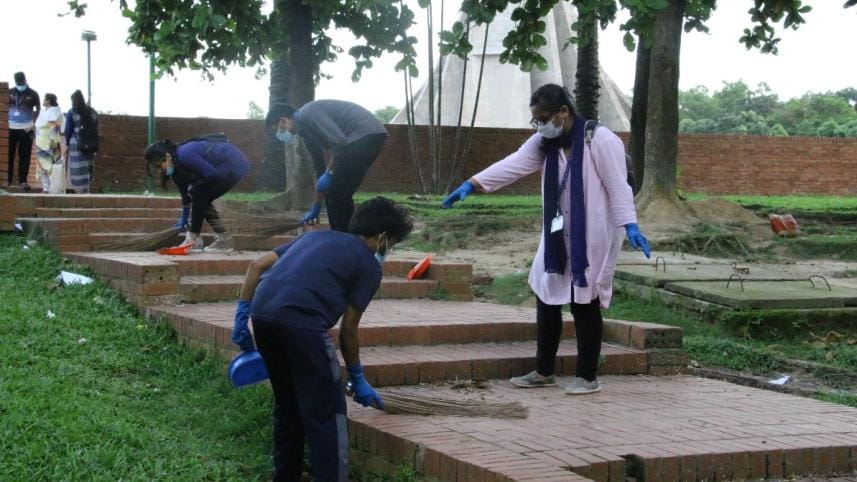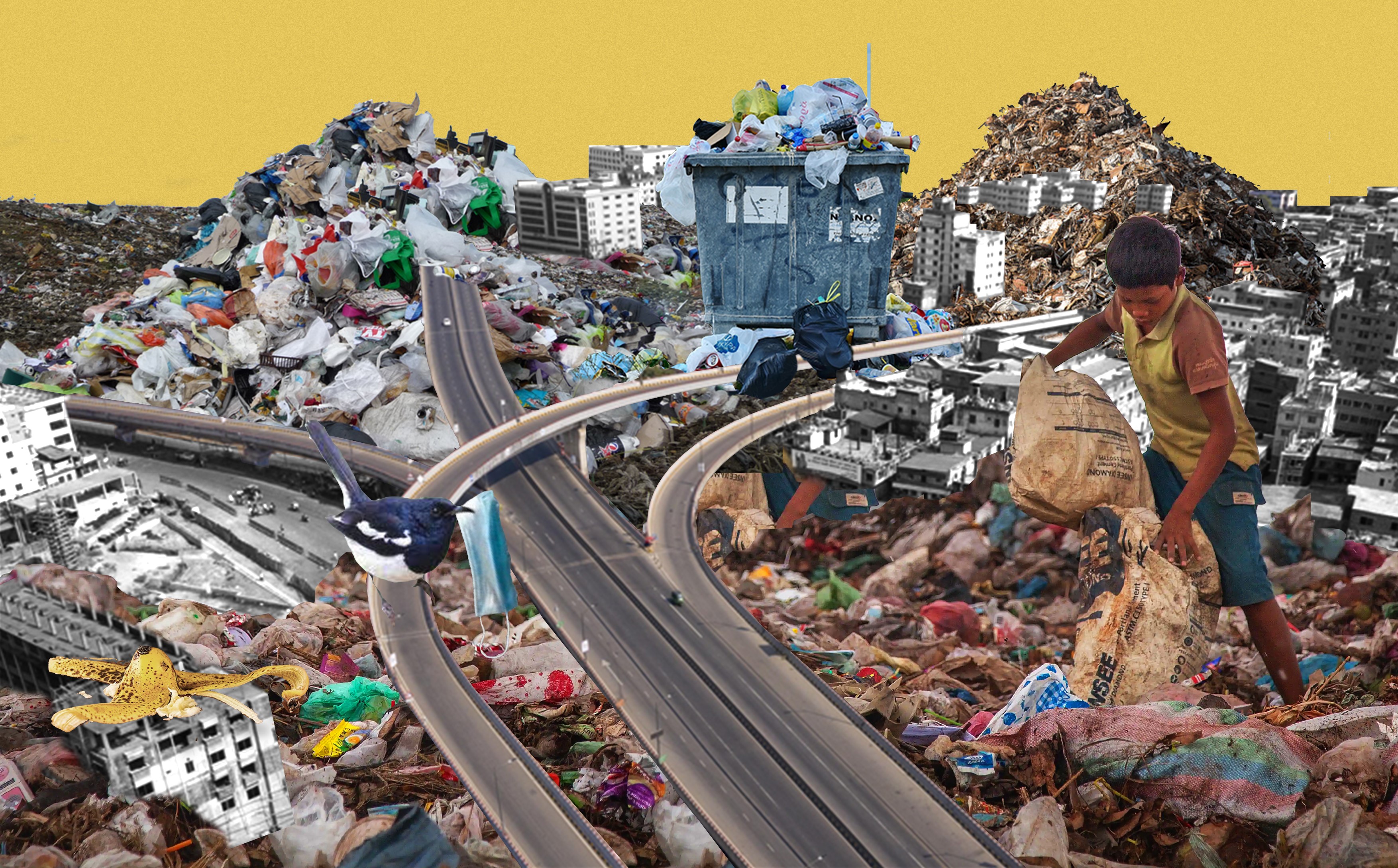The psychology of improper waste disposal in Dhaka

The Dhaka metropolitan area is teeming with a population of 22.5 million, according to UN estimates in 2021. In 1971, this population was 1.5 million. With a centralised administration and the best infrastructure in the country, including education, healthcare, and communication, Dhaka has been the focus of rapid urbanisation. This gives rise to numerous challenges – from unruly traffic, health and hygiene issues, social problems, and economic disparities, to their effects on the environment. With more people in a relatively small urban space, their consumption needs are bigger, which then translates into waste disposal problems.
This problem has become massive because of the indiscriminate manner of waste disposal by Dhaka residents, along with the insufficient and inefficient waste management practices. This is reflected in the accumulation of garbage in the streets, the playgrounds, open spaces, the landfills, etc. Why is this happening? What is the psychology of littering or improper waste management?
The root of the problem lies in human behaviour, especially people's apathy towards dealing with waste. For them, it is someone else's problem. Thus, they are not proactive about waste disposal and doing something about it. The individual is the beginning of the vicious circle; therefore, things must change with them first.
People are creatures of habit – they are practical and strive to make their lives easy. They don't mind doing the right thing as long as it doesn't disrupt their way of life. But their tendency is also to exert minimal effort to derive maximum satisfaction. The key issue is that people have little time or energy to waste, especially on issues such as waste disposal. Such actions are often mechanically performed as the human mind tends to follow a repetitive path. Unfortunately, this means Dhaka city is confronted with learned bad habits of its inhabitants. Some feel their peers and larger society are not recycling; why should they?
There's a term called "Habit Loop," which describes the essential features of habits: the trigger (waste accumulation at home), the behaviour (disposal of waste as conveniently as possible) and the reward (saving time by not experiencing the "hassle" of searching for a garbage bin or thinking of separating the waste by categories such as organic waste, liquid, recyclable or non-recyclable, and hazardous). Most people usually work in this "autopilot mode." As a result, bad habits become ingrained. This habit loop needs to be reframed. How so?
The idea of rewards would seem to offer some possibilities. We believe that creating the right incentives could play a significant role to break into and change the passive "autopilot" habits and turn them into active and more "thoughtful" ones, which would result in developing positive routines and impulses. A simple behavioural change, such as separating waste at the household level, would thus reflect a change of bad habits, which is then rewarded through a system of points.
Behavioural change is also facilitated by raising awareness about the significance and importance of dealing with household and other types of waste (cognitive learning theory) through education, both formal and informal, to help the city residents think more about their recycling behaviours and their far-reaching consequences. Raising awareness requires persistent efforts to make people put more thought into changing their waste disposal behaviour.
So how do we get a cleaner city? How do we protect ourselves from being afflicted by potential communicable diseases? How do we become better and more responsible residents of Dhaka?

As a city producing thousands of tonnes of solid waste a day, the problem could be broken down into four phases:
Phase 1 - The Pre-Waste Phase: This is where people are informed of how much they waste and their own carbon footprint to help them make responsible decisions when purchasing consumables, choosing packaging, daily usage of water, burning rubbish, using air conditioners year-round, printing pages unnecessarily, etc. This phase, involving behaviour change communication, can help transition to the next phase.
Phase 2 - The Act of Disposing: When people are made more conscious, they will begin to "segregate" waste properly. They may even begin to reuse some of it, expand the lifespan of an item, or repurpose it before dispensing with it.
Phase 3 - The Collection System: Behavioural change must be accompanied by an efficient waste collection system that is in sync with the households. This requires a proper, organised, and coordinated system of waste collection with timing/locations/logistics all worked out for the garbage-collecting rickshaw vans and trucks to collect and transport the waste.
Phase 4 - The Post-Waste Phase is essentially about how the waste is treated. Is everything ending up in the same landfill or is there a recognition of value in waste?
In some regions of the world, organic waste is composted and sold; in other areas, portions of the landfills are seeded with larvae that are fattened on organic waste and used later for fish or poultry feed. How are metals recovered? How are non-biodegradable waste treated? Do the current methods of recycling or composting have adverse effects on the environment? These questions must be given serious consideration.
Behaviours such as senseless littering, garbage not being collected, or primary and secondary waste segregation not coordinated with transportation can amplify the problem, especially if a value chain perspective is not adopted. But the root of this massive problem is about targeting and changing mindsets. And mindsets are embedded in culture and some inherent traits such as habits. As culture influences the way we are brought up and what we value, it affects our way of thinking, behaviour, and actions. Over time, some elements of culture will thus have to change.
Importantly, change will begin with the state of awareness at various levels, conscious reflection, and ethical behaviour. In addition, collaboration is critical at all levels: individual level, community level, and public service provider level, who must operate jointly within a set of regulations.
To benefit the household, the environment and the economy, the greening and cleaning of Dhaka (and other cities) is imperative and will only come with people acting consciously, incorporating innovative features of recycling, and developing teamwork between formal and informal bodies that make up the city. This process must begin soon.
This op-ed, the second in a four-part series, resulted from the authors' participation in the 23rd ASEF Summer University (ASEFSU23) interdisciplinary hackathon on "Livable Cities for a Sustainable Future" envisioned by Asian and European young professionals and students.
Irene Sergiou is an architect based in Nicosia, Cyprus.
Dr Syed Saad Andaleeb is distinguished professor emeritus at Pennsylvania State University and former vice-chancellor of Brac University.




 For all latest news, follow The Daily Star's Google News channel.
For all latest news, follow The Daily Star's Google News channel. 
Comments